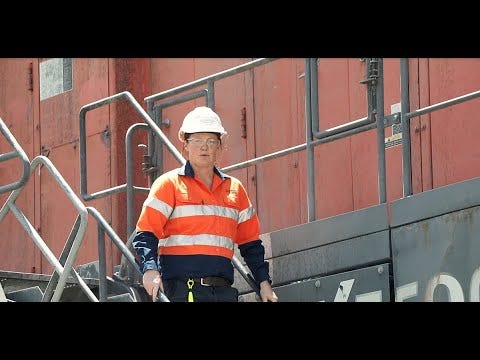Australian Lawmakers Demand Gas Reservation as Manufacturing Crisis Deepens
This piece is freely available to read. Become a paid subscriber today and help keep Mencari News financially afloat so that we can continue to pay our writers for their insight and expertise.
Today’s Article is brought to you by Empower your podcasting vision with a suite of creative solutions at your fingertips.

Australian lawmakers from across the political spectrum are converging on support for a domestic gas reservation policy as the nation’s manufacturing sector faces what industry leaders describe as an existential crisis, with revelations that foreign buyers are reselling Australian gas for profit while local industries pay some of the world’s highest energy prices.
The push for gas market intervention intensified Wednesday as BlueScope Steel CEO Mark Vassella told the National Press Club that Australia’s gas market dysfunction threatens to derail the federal government’s flagship Made in Australia manufacturing policy and cost thousands of jobs across the industrial sector.
“We are potentially going to lose that and de-industrialise. And there’s a serious sovereign risk that comes with that,” Vassella told the gathering, calling for immediate government action to redirect uncontracted gas supplies to domestic users.
The urgency comes as Australia pays an average of $10 per gigajoule for its own natural gas—nearly five times what American manufacturers pay and more than quadruple Qatar’s domestic price of $2.20, according to industry figures cited during parliamentary discussions Wednesday.
Truth matters. Quality journalism costs.
Your subscription to Mencari directly funds the investigative reporting our democracy needs. For less than a coffee per week, you enable our journalists to uncover stories that powerful interests would rather keep hidden. There is no corporate influence involved. No compromises. Just honest journalism when we need it most.
Not ready to be paid subscribe, but appreciate the newsletter ? Grab us a beer or snag the exclusive ad spot at the top of next week's newsletter.
Ed Husic, Labor MP and former Minister for Industry and Science, delivered perhaps the strongest call for intervention, revealing that Japan has resold between 600 and 800 petajoules of Australian gas over consecutive years—nearly double what Australia’s entire East Coast consumes—while simultaneously lobbying against domestic reservation policies.
“If they are on selling at a phenomenal rate to South Korea and Taiwan, for example, or some of the markets that they’re on selling to, nearly double what we use on the East Coast and we are paying incredible price as a result, that’s not good,” Husic said in an interview on ABC’s Afternoon Briefing.
Husic advocated for “use it or lose it” mechanisms that would allow Australia to reclaim gas from foreign buyers who purchase Australian LNG but resell it rather than using it for their own energy security. “If the foreign buyers are not using it for themselves and are simply using it to make money by on-selling it, we should have a mechanism to intervene,” he said.
The controversy highlights a growing frustration within Australian politics that the nation—despite being one of the world’s largest gas exporters—cannot provide affordable energy to its own industries. Gas demand on Australia’s East Coast has fallen 20 percent over the past decade, yet prices have soared as export contracts lock in supply for foreign markets.
Shadow Minister for Industry and Innovation Alex Hawke confirmed the Coalition took a domestic gas reservation policy to the last federal election but faced criticism from industry for being too aggressive. The opposition is now reviewing its approach through an Energy Review Task Force.
“We talked to the last election of domestic gas reservation policy,” Hawke said. “However, there is real scope in what we’re doing in energy for using Australian gas for Australian interests first and making sure manufacturing can have a regular cheap supply of energy so we can compete.”
Resources Minister Madeleine King recently sought to reassure Asian investors that Australia remains a reliable energy partner, signaling the government’s reluctance to interfere with existing long-term contracts. However, Husic pushed back against this positioning, arguing that Australia should not be “browbeaten easily by either the foreign multinationals that have set up the contract prices for export or the foreign buyers that are making money by on-selling the gas.”
The Australian Competition and Consumer Commission has twice questioned whether existing interventions—including the gas trigger, gas code, and voluntary heads of agreement between government and producers—are effectively controlling domestic prices.
BlueScope’s Vassella emphasized that while redirecting contracted supply could create sovereign risk with trading partners, sufficient uncontracted gas exists to make a meaningful difference for Australian manufacturers without breaching existing agreements. “There’s enough uncontracted gas to be redirected that we think could occur, make a change for the Australian economy and not create any sovereign risk,” he said.
The manufacturing sector’s crisis extends beyond gas pricing. Husic identified Chinese overproduction and deliberate export dumping as additional pressures facing Australian heavy industry, particularly in steel and copper production. “When domestic consumption can’t sustain the growth at the level that they want, they pull the lever of exports. They’re notoriously big overproducers,” Husic said of China’s industrial strategy.
The gas debate comes as the federal government conducts a comprehensive review of gas markets, with indications that some form of reservation policy is under serious consideration. However, the scope of any intervention—particularly whether it would apply to existing contracts or only new agreements—remains unclear.
Industry groups representing manufacturers have intensified lobbying efforts, warning that without access to competitively priced gas, Australia faces a wave of industrial closures that would eliminate sovereign manufacturing capability built over decades. Companies including Orica, Incitec Pivot, and other major industrial operations have echoed BlueScope’s concerns about energy costs threatening their viability.
The political convergence around gas reservation marks a rare moment of potential cross-party agreement, though significant details remain contested. The Coalition’s policy is under review, Labor’s gas market review is ongoing, and the Greens have called for clean energy conditions to be attached to any government support for energy-intensive industries.
Hawke noted that while the Coalition’s previous policy faced industry pushback for being too interventionist, the party remains committed to ensuring “Australian gas for Australian interests first.” He suggested the policy review would examine how to balance domestic energy security with maintaining Australia’s reputation as a reliable trading partner.
The debate also touches on broader questions about Australia’s relationship with foreign multinationals operating in its resources sector. Both major parties have raised concerns about companies seeking government support while minimizing tax contributions, with Husic specifically noting that companies “can’t be ones that are asking for money while not putting money in as tax revenue themselves.”
Vassella’s address to the National Press Club emphasized that immediate action is required to prevent permanent loss of manufacturing capability. “Right now we’re facing into a serious sovereign risk when it comes to our manufacturing capacity,” he warned, describing the potential de-industrialization of Australia as a threat comparable to energy security concerns raised by trading partners.
The convergence of political support suggests that some form of gas market intervention is increasingly likely, though the timeline and specific mechanisms remain subject to negotiation between stakeholders including government, industry, foreign buyers, and domestic producers.
Sustaining Mencari Requires Your Support
Independent journalism costs money. Help us continue delivering in-depth investigations and unfiltered commentary on the world's real stories. Your financial contribution enables thorough investigative work and thoughtful analysis, all supported by a dedicated community committed to accuracy and transparency.
Subscribe today to unlock our full archive of investigative reporting and fearless analysis. Subscribing to independent media outlets represents more than just information consumption—it embodies a commitment to factual reporting.
As well as knowing you’re keeping Mencari (Australia) alive, you’ll also get:
Get breaking news AS IT HAPPENS - Gain instant access to our real-time coverage and analysis when major stories break, keeping you ahead of the curve
Unlock our COMPLETE content library - Enjoy unlimited access to every newsletter, podcast episode, and exclusive archive—all seamlessly available in your favorite podcast apps.
Join the conversation that matters - Be part of our vibrant community with full commenting privileges on all content, directly supporting The Evening Post (Australia)
Catch up on some of Mencari’s recent stories:
It only takes a minute to help us investigate fearlessly and expose lies and wrongdoing to hold power accountable. Thanks!







